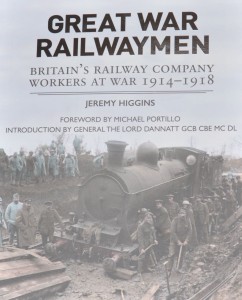The First World War was not the first in which railways played an important role but it was the first to use railways on such a scale.
For WW1 was a war like no other. The numbers involved are staggering in terms of men and materiel. They needed transport and here the railway stepped forward. It carried men at home and abroad. It carried ammunition. For the Western Front, this amounted to 5 million tons for British forces.
Much of this ammunition was fired by the Royal Artillery but was supplied via railways run by the Royal Engineers.
Over 12,500 railwaymen died in the war. Their story prompted CrossCountry Customer Service Director Jeremy Higgins to look more closely into their stories in an attempt to look beyond the names found on memorials across Britain’s rail network.
Jeremy also had an interest that extended beyond simply railways as a Royal Artillery officer in the Army Reserve with service in Iraq and Afghanistan.
The result is his book, Great War Railwaymen, published last autumn. In it, he looks at the stories of railwaymen serving in the Army, Navy and Air Force, both those serving in railway roles and those serving in other posts.
It’s a fascinating tale both of the men and the railways of the Western Front and elsewhere. The railway occupations of those who died stretch from the well-known roles of clerk, porter and fireman to those less-known, such as rullyman (a cart driver). Absent from the list is driver, which I’ll admit surprised me. Clearly, drivers were needed to run trains in Britain but surely this also applies to firemen and signalmen?
Throughout the book are vignettes of letters, citations for awards (including seven Victoria Crosses) and panels showing when and where railwaymen died. Covered too are ambulance trains and railway guns, as well as narrow gauge operations behind the lines in France and the work of the Railway Operation Division which ran Army railways in France and elsewhere. There’s a place too for the work of the railway companies within Britain, not just in running their networks but also by turning their engineering works to important war production.
Great War Railwaymen is a fine book that does much to explain their role in World War One.
